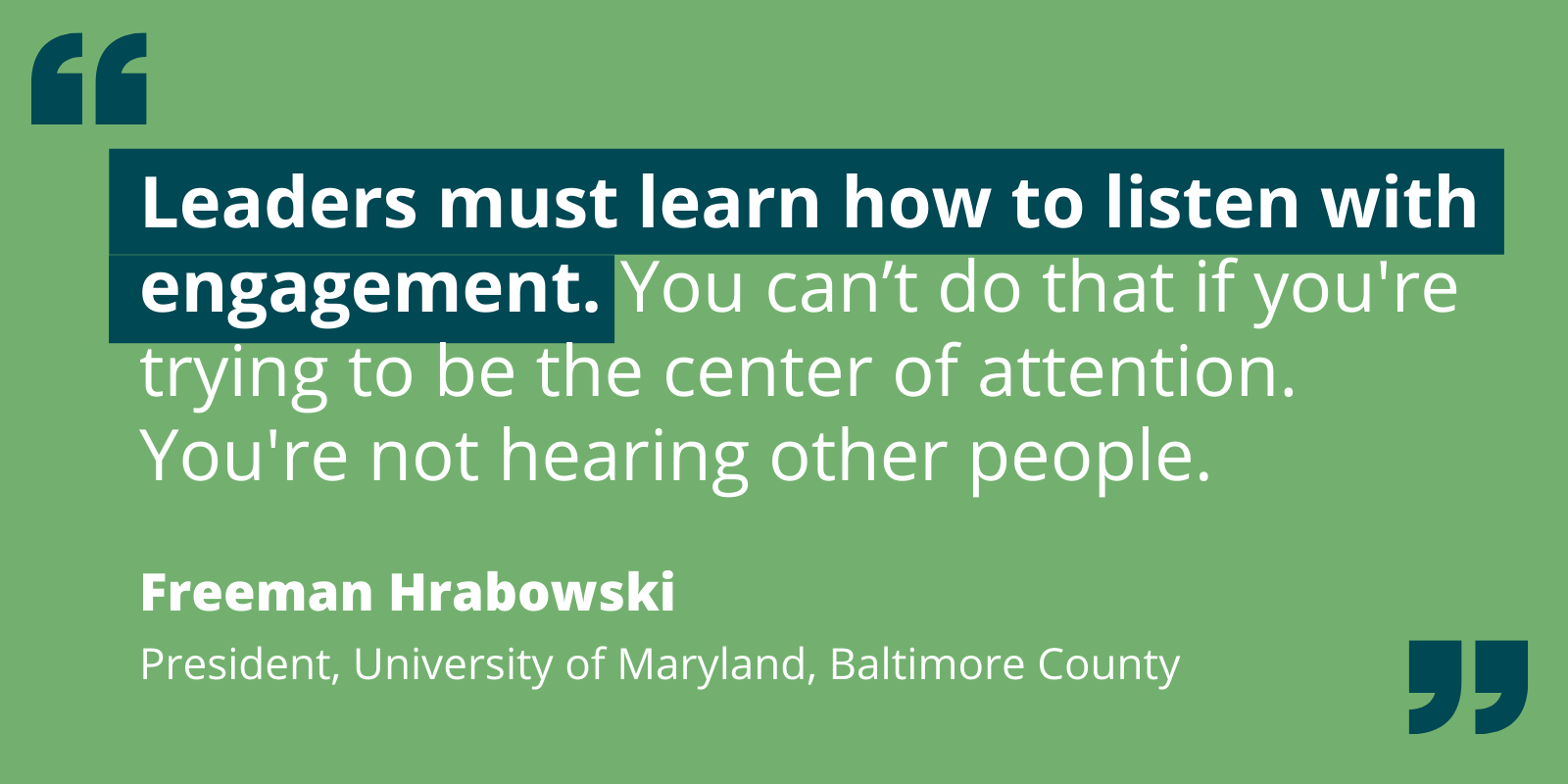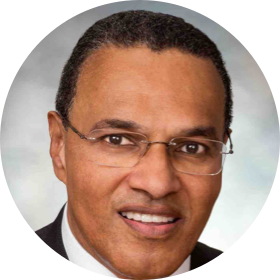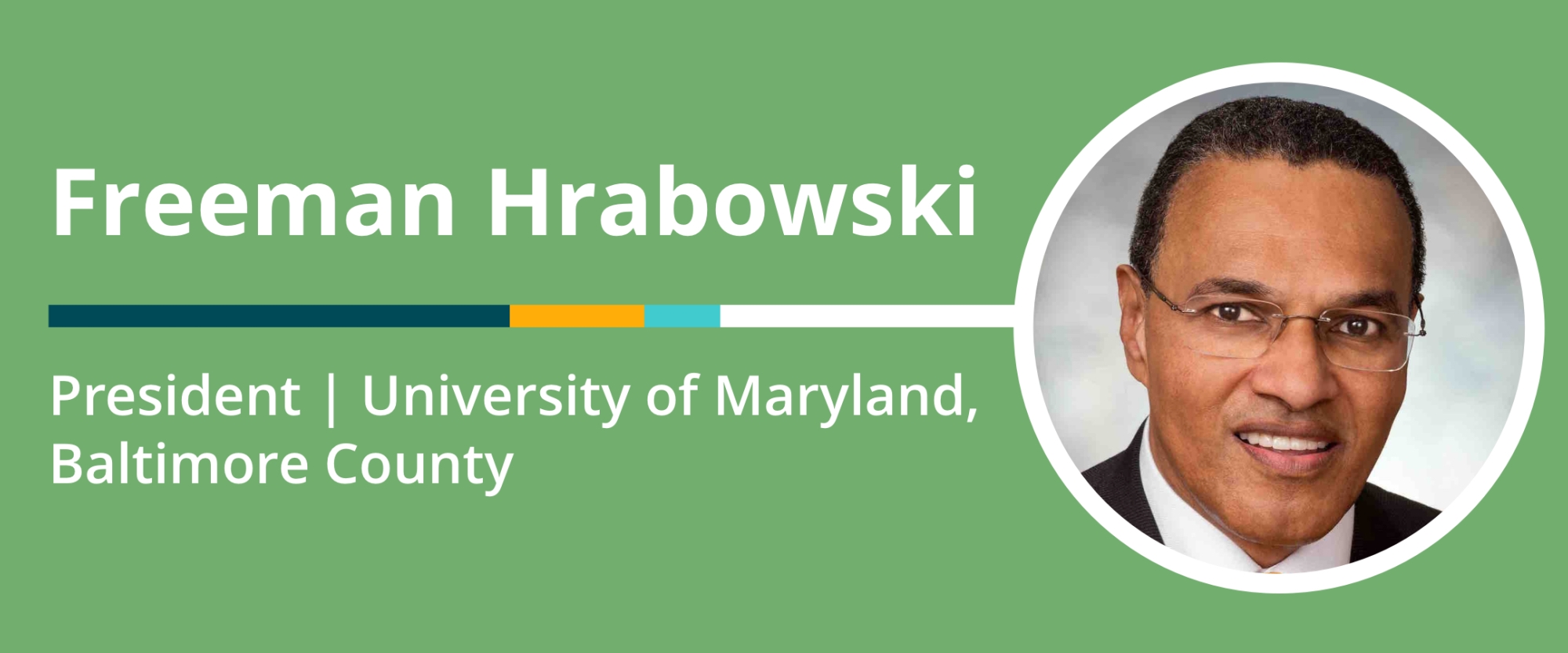We were honored to speak again with Freeman Hrabowski, President of University of Maryland, Baltimore County for our third conversation on the Weekly Wisdom Podcast. Since our previous chat, President Hrabowski has announced his retirement, and it was the perfect moment to seek his wisdom about what he's learned over the years, what incoming leaders can expect from the current state of higher ed, and how they can best prepare themselves for the challenges of leadership.
When to Speak and When to Listen
Stepping down from his 30-year leadership role at UMBC, President Hrabowski remained positive and inspiring as ever when we asked him to share the most surprising things about his long career.
"The challenges of humankind are always there," he observed. "And you have the same feelings that you had when you were 25 or 30. The other part is the wonderful experience of drawing on life, and that the few words we give of encouragement can make a big difference. That has been amazing to me, how often a student can say something and elevate my spirit. We connect to other people, and we either elevate them or we bring them down. That’s the message of this experience of mine in higher education."
President Hrabowski also admitted that decades of leadership helped him grow out of being the over-eager young man ready to jump into action before grasping the whole picture.
"I didn’t take the time to savor the experience, and to think about what I was learning," he reflected. "In my first years as President, I was very quick to give my opinion, and to start thinking about the solving of the problem, as opposed to knowing, as the leader, I needed to shut up. I needed to listen actively. This is one of the points in our new book that my colleagues and I are writing on this pre/post-COVID period, that leaders must learn how to listen with engagement. You can’t do that if you're trying to talk and be the center of attention. You're not hearing the other people. Of all the things I can say, it was learning to be humble enough to be quiet, to be silent. And there are times now when my colleagues will give me a look like, 'Shut up!'"

A Clear-Eyed Look at the Future of Higher Ed
President Hrabowski's long tenure at UMBC has given him a clear perspective of this moment in higher education as an industry, sector, and social enterprise. One of his principal concerns is that the value of higher ed is being widely questioned.
"First of all, most people don’t realize that only about a third of Americans have family that have gotten people through the four-year experience," he told us. "Secondly, too few have had the community college experience. We all know people who are educated, and so we assume most people are. We can be very condescending in the higher education community without realizing it. How should we be talking about the value of education to people who have not experienced it in their families? We have more work to do. We should not be satisfied with ourselves."
He offered this example: "Everybody wants to criticize Congress, but all the members of Congress, or almost all, are graduates of our institutions, and liberally educated people. And yet somehow our leaders are not talking to each other. We have not taught those who have come through our experience how to figure out how to get people with different points of view to come to the table and talk it through. People who come into our institutions leave with the same points of view as they had when they came in. What does that mean about what difference we made?
"Another piece is we say we know our students," President Hrabowski added. "I say we have much more to know about our students. The Innovation Alliance has taken us to a new level. We've got one of the Completion Grants right now. Students are working on this asset-based or strengths-based approach. Which means that we are changing the narrative to help returning students appreciate what they bring to the table. We need to do much more of that. These people are bringing life’s experiences. And they have so much to offer in the classroom.
"The other one I would bring up would be the role universities play in thinking about the future of our democracy. There’s so much more we can do. What are universities doing to prepare the next set of leaders to help the general public understand how we're connected across the globe? It has to be, I think, far more proactive, more intentional in this protection of democracy than we've been. We need to be thinking about ways of having people connect the disciplines, as we think about solving the problems of humankind. We need more substance as we think about curriculum, teaching and learning, the research that we do of connecting to the larger community."
Wisdom for Incoming Leaders
When we asked President Hrabowski whether future higher ed leaders would need a different set of skills and attributes, he referred to some of the perspectives that he shares with his mentees in the ACE Fellows Program.
"Some of the core things are still there: authenticity and being honest," he began. "The idea of clearly being able to say, 'I made a mistake and I need your help.' That notion of being confident that you'll do your best, but humble enough to know we all need help. I think the notion of transparency and honesty are even more important today, because our society is going through this period when people question the truth. Now more than ever, we must speak up for truth and evidence, and the idea that expertise matters. And most important, that we can get through this period. Having that optimism that says we can be realistic on the one hand. The other problems are hard and difficult. But we can get through this."
He offered also this practical suggestion for new leaders:
"Leadership positions in general can be very stressful. All of us need to know ourselves well enough to know what it takes to remain healthy. That means emotional, and spiritual, physical, mental health. I've seen what has happened to leaders who didn’t take care of themselves. You’d be surprised how many end up in very difficult situation, physically or mentally, just because of the stress. We need to take the time to look at everything from nutrition to physical health to having people to talk to about the challenges that affect one’s mental state. The more secure one is, the more one can say, 'I need help.' I don't know anyone who doesn’t need some support in that way, given what we go through."
President Hrabowski said that, even at this late stage in his career, he still heeds the advice of his long-ago mentor Walter Sondheim: live life seriously, but don’t take it seriously.
"People have said, 'Freeman, don’t ever think you're not replaceable.' Other great things happen. Other great people come along. This is an empowered campus. There are so many leaders. We're going to take care of our students. We're going to support young faculty and staff. And laugh. We need to be able to laugh. That is the human experience. Of course, cry. But laugh. That’s what I've heard, and that’s what I'm taking with me as I'm leaving my colleagues. People are looking a little sad, and I said, 'Even if we might cry a little bit because it’s a change, change brings about this moment of bittersweet. Laugh because we are so fortunately to have had this experience.' Having the right attitude of optimism, of hope, this is what makes us leaders who can connect meaningfully to other people."
Note: This interview in the Weekly Wisdom Series originally aired on March 28, 2022 as part of the University Innovation Alliance’s Innovating Together Podcast, appearing live on Facebook, Twitter, and LinkedIn.
Links Mentioned in This Episode
• University of Maryland, Baltimore County
• Weekly Wisdom Podcast
• Our previous chat ("Collaboration and the Empowered University: A Conversation with Freeman Hrabowski, III, President, University of Maryland, Baltimore County" by Bridget Burns, 7/22/21)
• Completion Grants (University Innovation Alliance program offering financial assistance to under-resourced students close to graduation)
• ACE Fellows Program (American Council on Education program for the study and practice of institutional leadership)
• Walter Sondheim (Baltimore civic leader who played crucial roles in school desegregation and downtown redevelopment)
Bios of Guest and Co-Hosts

Guest: Freeman Hrabowski, President, University of Maryland, Baltimore County
Dr. Freeman A. Hrabowski, III, has served as President of U.M.B.C. (The University of Maryland, Baltimore County) since 1992. His research and publications focus on science and math education, with special emphasis on minority participation and performance. He chaired the National Academies’ committee that produced the 2011 report, Expanding Underrepresented Minority Participation: America’s Science and Technology Talent at the Crossroads. He was named in 2012 by President Obama to chair the President’s Advisory Commission on Educational Excellence for African Americans. Dr. Hrabowski serves as a consultant to the National Science Foundation, the National Institutes of Health, the National Academies, and universities and school systems nationally; and on several foundation boards. With philanthropist Robert Meyerhoff, he co-founded the Meyerhoff Scholars Program in 1988 for advancing underrepresented minorities in science and engineering. Dr. Hrabowski is the author of Holding Fast to Dreams: Empowering Youth from the Civil Rights Crusade to STEM Achievement, and co-author of Beating the Odds: Raising Academically Successful African American Males, Overcoming the Odds: Raising Academically Successful African American Young Women, and The Empowered University: Shared Leadership, Culture Change, and Academic Success. As child-leader in the Civil Rights Movement, he was prominently featured in Spike Lee’s 1997 documentary Four Little Girls, on the racially motivated bombing in 1963 of Birmingham’s Sixteenth Street Baptist Church.

Co-Host: Bridget Burns, CEO, University Innovation Alliance
Dr. Bridget Burns is the founder and CEO of the University Innovation Alliance (UIA). For the past decade, she has advised university presidents, system chancellors, and state and federal policy leaders on strategies to expand access to higher education, address costs, and promote completion for students of all backgrounds. The UIA was developed during Bridget’s tenure as an American Council on Education (A.C.E.) Fellowship at Arizona State University. She held multiple roles within the Oregon University System, including serving as Chief of Staff and Senior Policy Advisor, where she won the national award for innovation in higher education government relations. She was a National Associate for the National Center for Public Policy and Higher Education, and has served on several statewide governing boards including ones governing higher education institutions, financial aid policy, and policy areas impacting children and families.

Co-Host: Doug Lederman, Editor and Co-Founder, Inside Higher Ed
Doug Lederman is editor and co-founder of Inside Higher Ed. With Scott Jaschik, he leads the site's editorial operations, overseeing news content, opinion pieces, career advice, blogs and other features. Doug speaks widely about higher education, including on C-Span and National Public Radio and at meetings and on campuses around the country. His work has appeared in The New York Times and USA Today, among other publications. Doug was managing editor of The Chronicle of Higher Education from 1999 to 2003, after working at The Chronicle since 1986 in a variety of roles. He has won three National Awards for Education Reporting from the Education Writers Association, including one for a 2009 series of Inside Higher Ed articles on college rankings. He began his career as a news clerk at The New York Times. He grew up in Shaker Heights, Ohio, and graduated in 1984 from Princeton University. Doug and his wife, Kate Scharff, live in Bethesda, MD.
About Weekly Wisdom
Weekly Wisdom is an event series that happens live on Facebook, Twitter, and LinkedIn. It also becomes a podcast episode. Every week, we join forces with Inside Higher Ed and talk with a sitting college president or chancellor about how they're specifically navigating the challenges of this moment. These conversations will be filled with practicable things you can do right now by unpacking how and why college leaders are making decisions within higher education. Hopefully, these episodes will also leave you with a sense of optimism and a bit of inspiration.
Rate, Review & Subscribe
Learn why hundreds of people have rated this new podcast 5 stars! Please join others and rate and review this podcast. This helps us reach and inform more people -- like you -- to help increase the number and diversity of college graduates in the United States.
Click here, scroll to the bottom, tap to rate with five stars, and select “Write a Review.” Then be sure to let us know what you loved most about the episode! Also, if you haven’t done so already, subscribe to the podcast. We’ll be adding a bunch of bonus episodes to the feed and, if you’re not subscribed, there’s a good chance you’ll miss out.

